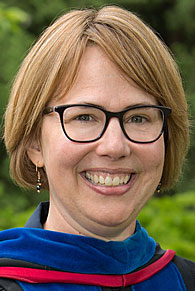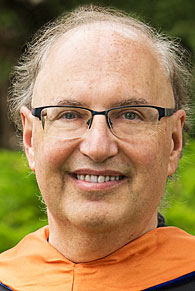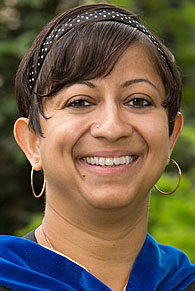Three members of the Lawrence University faculty were recognized for teaching and scholarship excellence Sunday, June 10 at the college’s 169th commencement.
Karen Hoffmann, associate professor of English and diversity enhancement faculty director, received the Award for Excellence in Teaching, which recognizes outstanding performance in the teaching process, including the quest to ensure students reach their full development as individuals, human beings and future leaders of society.

A 1987 Lawrence graduate, Hoffmann returned to her alma mater in 1998. Her research interests focus on early 20th-century British and American literature, gender and literature and African-American literature, including experimental literary forms from the Harlem Renaissance that question racial boundaries or consider race as a social construct.
In presenting her award, Catherine Gunther Kodat, provost and dean of the faculty, cited Hoffmann for distinguishing herself “as one of our finest teachers, dedicated to bringing out the best in your students as thinkers, writers and readers with an appreciation for the great beauty and variety of literary expression.”
“Students praise your clarity, fairness and consistency in establishing criteria for graded work, your skills as a leader of rich, nuanced discussion and, above all, your empathy and dedication to meeting students where they are and bringing them forward to a new level of skill and understanding,” Kodat added.
Hoffmann previously was recognized in 2010 with Lawrence’s Freshman Studies Teaching Award.
After earning her bachelor’s degree in English at Lawrence, Hoffmann earned a master’s degree and Ph.D. in English and American literature from Indiana University.
Jerald Podair, Robert S. French Professor of American Studies and professor of history, received the Award for Excellence in Scholarship. Established in 2006, the award recognizes a faculty member who has demonstrated sustained scholarly excellence for a number of years and whose work exemplifies the ideals of the teacher-scholar.

He also received the award in 2010 and is the only two-time winner in the award’s history.
A member of the faculty since 1998, Podair earned national recognition for his 2017 book “City of Dreams: Dodger Stadium and the Birth of Modern Los Angeles” (Princeton University Press). In addition to a host of positive reviews, the book was named the winner of the 2018 Dr. Harold and Dorothy Seymour Medal of the Society for American Baseball Research as the best book on baseball history or biography published in the preceding year. Podair was honored in March at the SABR annual banquet in Tempe, Ariz.
The book also was selected as one of five finalists for a 2018 PEN/ESPN Award for Literary Sports Writing. The PEN America awards honor writers and translators whose exceptional literary works were published the previous year.
“In your 20 years at Lawrence University, you have distinguished yourself as one of our most prolific and accomplished scholars, producing highly regarded, award-winning studies on U.S. political and historical topics involving modern civil rights struggles and contemporary urban history,” said Kodat in honoring Podair. “The 2017 publication of ‘City of Dreams: Dodger Stadium and the Birth of Modern Los Angeles,’ is the latest, and arguably the most august, chapter in this already impressive narrative.”
A specialist on 20th-century American history and race relations, Podair also is the author of the books “The Strike That Changed New York: Blacks, Whites, and the Ocean Hill-Brownsville Crisis” and “Bayard Rustin: American Dreamer,” a biography of the civil rights leader who planned the 1963 March on Washington.
He was the recipient of the 1998 Allan Nevins Prize, an award conferred by the Society of American Historians for the best Ph. D. dissertation in history written in the country that year. He was named a fellow of the New York Academy of History in 2009 and was appointed by the governor to Wisconsin’s Abraham Lincoln Bicentennial Commission, on which he served from 2008 to 2009.
A native of New York City, Podair earned a bachelor’s degree at New York University, a law degree from Columbia University and his Ph.D. from Princeton University.
Lavanya Proctor, assistant professor of anthropology, was presented the Award for Excellent Teaching by an Early Career Faculty Member, which recognizes demonstrated excellence in the classroom and the promise of continued growth.

A specialist in linguistic anthropology, English and globalization, gender and sexuality, including recent research on LGBTQ+ Americans of South Asian descent, Proctor originally joined the faculty in 2010 as a visiting assistant professor of anthropology. She spent two years teaching at SUNY-Buffalo State before returning in the fall of 2014 with a tenure-track appointment to the anthropology department.
Proctor has taught Freshman Studies as well as core anthropology courses and research methods classes, but she also has helped debut some new courses recently, including “Economic Anthropology,” “Anthropology of South Asia” and “Anthropology and New Media.”
“Since coming to Lawrence, you have distinguished yourself as an energetic, enthusiastic teacher, known for creating a dynamic learning environment in which students feel both pushed to perform and deeply supported,” said Kodat in presenting Proctor her award. “While contributing to core courses, you have also freshened the curriculum, introducing students to fresh vistas in anthropology and whetting their appetite for further study.
“Students consistently praise not only your high standards, but also your remarkable ability to remain open and deeply interested in their own contributions to course materials,” Kodat added.
Proctor was the recipient of an American Anthropological Association Leadership Fellow position in 2013. She earned a bachelor’s and two master’s degrees in sociology at the University of Delhi in India as well as a master’s degree and a Ph.D. in anthropology from the University of Iowa.
About Lawrence University
Founded in 1847, Lawrence University uniquely integrates a college of liberal arts and sciences with a nationally recognized conservatory of music, both devoted exclusively to undergraduate education. It was selected for inclusion in the book “Colleges That Change Lives: 40 Schools That Will Change the Way You Think About College.” Engaged learning, the development of multiple interests and community outreach are central to the Lawrence experience. Lawrence draws its 1,500 students from nearly every state and more than 50 countries.